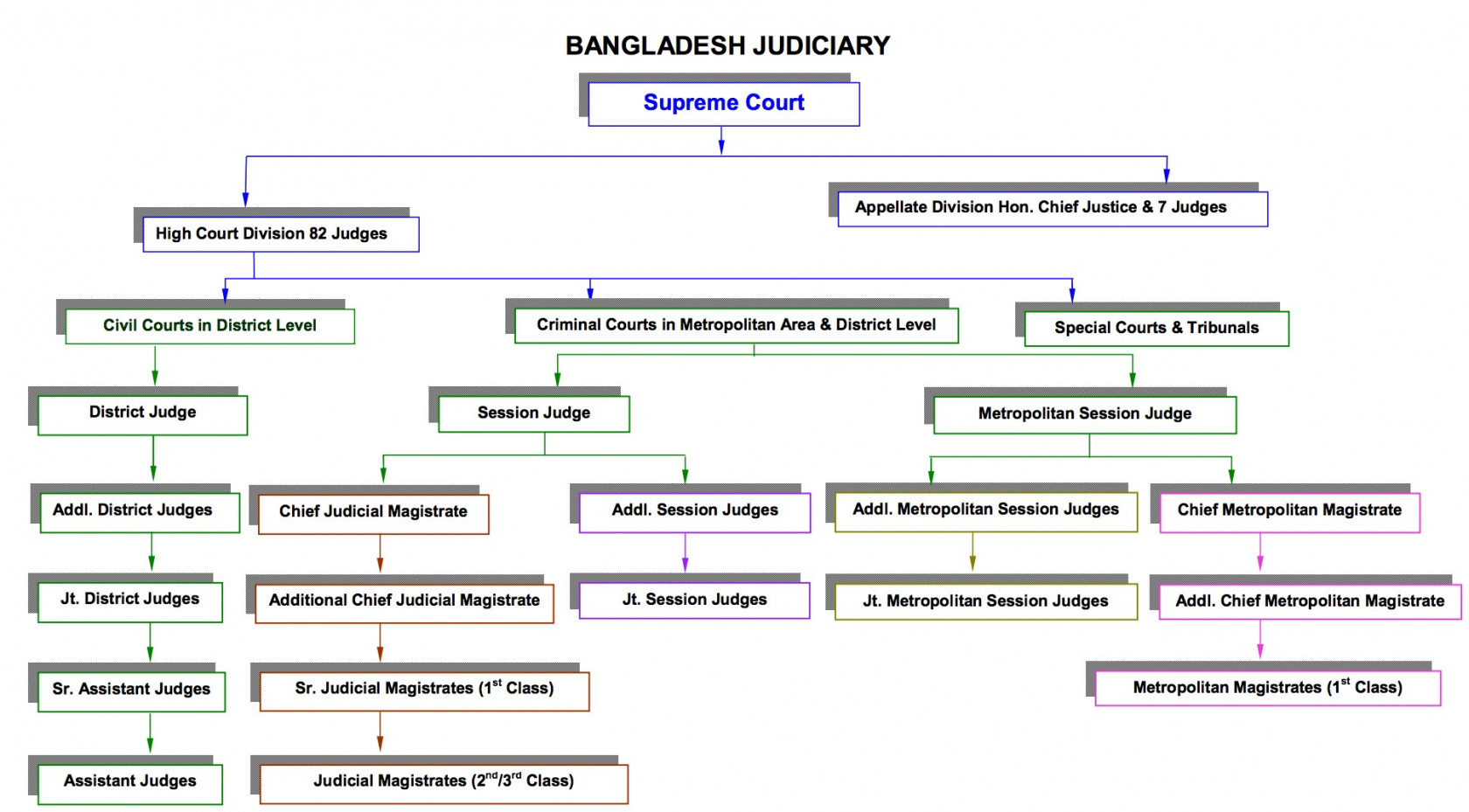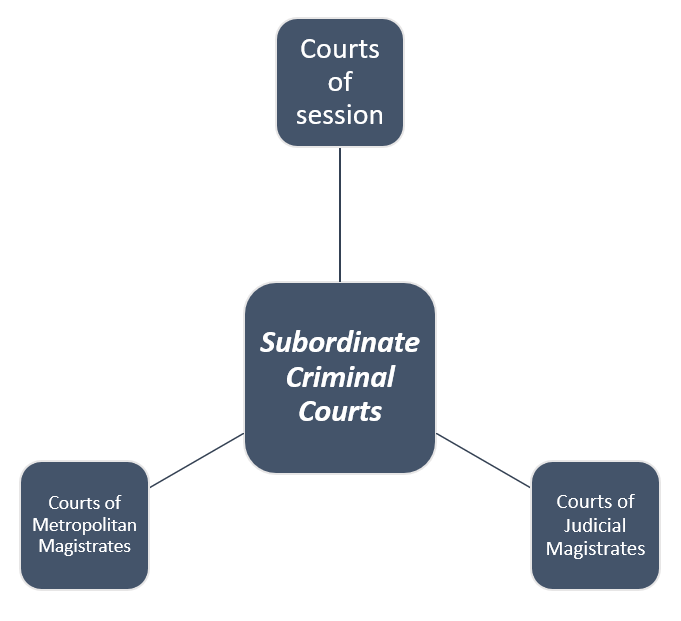Bangladesh Judiciary Court Structure (Part-2)
The court structure in Bangladesh
Figure: The court structure in Bangladesh
Subordinate criminal courts
There are several classes of subordinate criminal courts. These are courts of session, courts of judicial magistrates, and courts of metropolitan magistrates. Courts of judicial magistrates include the chief judicial magistrate, additional chief judicial magistrate, and judicial magistrates of the first, second, and third class. Courts of metropolitan magistrates include the courts of the chief metropolitan magistrate, additional chief metropolitan magistrate, and other metropolitan magistrates all exercising power of first-class judicial magistrate. Divisional Commissioner transformed the functions of the court of session for the three hill districts, but since 2008 courts of sessions have been set up in the hill districts. Since January 1999 metropolitan courts of session have been established for the Dhaka and Chittagong metropolitan areas. For performing functions other than judicial there are executive magistrates.
Figure: Criman court class
District judges have been empowered to function as sessions judges, additional district judges as additional sessions judges and joint district judges as joint sessions judges in the districts. In every district, the district judge performs the functions of the sessions judge; additional district judge or judges those of the additional sessions judge or judges and joint district judges those of the joint sessions judges.
Metropolitan session courts have been constituted with former district judges as the metropolitan sessions judges, former additional district judges as metropolitan additional sessions judges and former joint district judges as metropolitan joint sessions judges in those metropolitan areas. Joint sessions judges are subordinate to the sessions judges and sessions judges may make rules for the distribution of business to joint sessions judges. Though additional sessions judges exercise the same power as exercised by the sessions judges business may be distributed by the sessions judge of the district to the additional sessions judge or judges in that district.
Judges of the courts of the session also function as special judges under the Criminal Law (Amendment) Act 1958 to try offences under the provisions of Prevention of Corruption Act 1947, and now repealed Anti-Corruption Act 1957 replaced at present by the Durniti Daman Commission Ain 2004. Judges of the courts of the session also act as special tribunals to try offences under the provisions of the Special Powers Act 1974. Sessions judge, additional sessions judge or joint sessions judge acting as the special tribunal may award any sentence authorised by law. Sessions judges and additional session judges also act as Special Courts for suppression of repression of women and children under the provisions of the Suppression of Repression of Women and Children (Special Provisions) Act 2000.
Sessions judges also act as Public Safety Tribunals under the Public Safety (Special Provisions) Act, 2000 for trying offences under that Act. By the Public Safety (Special Provisions) (Amendment) Act, 2002 most of the provisions of the said Act has been repealed but provided for the continuation of the pending cases under the said Act reserving power in the government to withdraw appropriate cases. Those repealed provisions have been re-enacted in slightly modified form by the Law and Order Disruptive Crimes (Speedy Trial) Act 2002, and metropolitan magistrates and judicial magistrates of the first class have been empowered to try such offences within a very short time as Speedy Trial Courts.
Administrative tribunals
Administrative tribunals have been established by the government and each of the tribunals consists of one member appointed by the government from amongst persons who are or have been district judges. The administrative tribunal has exclusive jurisdiction to hear and determine applications made by any person in the service of the Republic (excluding a person in the defence service) or specified bodies and organisations such as Bangladesh Bank etc in respect of terms and conditions of his service including pension rights or any action taken in relation to him as a person in such service. An appeal lies from the decision of the administrative tribunal to the administrative appellate tribunal consisting of a chairman and two members. The chairman shall be a person who is, or has been, or is qualified to be a judge of the Supreme Court or is or has been an officer in the service of the Republic not below the rank of additional secretary to the government. The government appoints a retired judge of the Supreme Court as chairman. One of the members is appointed from amongst the retired or serving district judges and another from amongst the retired or serving joint secretaries of the government. Appeal from the decision of the administrative appellate tribunal lies to the appellate division of the Supreme Court with leave of that division.
Labour Courts have been established to adjudicate disputes regarding the employment of commercial or industrial labour. Each of the Labour Courts consists of a chairman and two members. The chairman is appointed from amongst the district judges or additional district judges and one of the members is appointed in consultation with the employers and the other in consultation with the workmen. Labour Court adjudicates and decides industrial disputes, implementation or violation of settlements, and complaints made between the employers and workers and complaints made by workers in respect of retrenchment, lay off, termination and dismissal from service, nonpayment of wages or compensation for disablement in course of service, and it also tries offences in respect of unfair labour practices, breach of or failure to implement the settlement, illegal strike or lock-out and non-compliance of Labour Court's order. Any party aggrieved by an award of the Labour Court may prefer an appeal to the Labour Appellate Tribunal. Such tribunal consists of one member only appointed by the government from amongst the sitting or retired judges of the Supreme Court. Labour appellate tribunal is required to dispose of an appeal against an award of the Labour Court in respect of any labour dispute as the reinstatement of any worker or workers in service within 180 days of filing the same. But no appeal lies from the decision of the labour court. If any party feels aggrieved by the decision of the labour court he may file an application before the High Court Division for issuing a writ of certiorari to examine the record of the case to satisfy itself as to the legality or propriety of the same. The decision of the labour court as commissioner of workmen's compensation is appealable to the High Court Division.
Court of Settlement
Following the liberation of Bangladesh, the government promulgated Abandoned Property (Control, Management and Disposal) Order 1972 (President's Order No.16 of 1972) and made provisions for taking over control, management and disposal of properties that fell within the definition of abandoned property. Disputes arose about the decision of the government in respect of such properties and to set at rest such disputes forever the government made provisions under the Abandoned Buildings (Supplementary Provisions) Ordinance 1985 for publishing list of all abandoned buildings in the official gazette and for deciding the claims to such properties by a tribunal called the Court of Settlement. The court of settlement has been constituted by the government with a chairman and two other members. The chairman is appointed from amongst persons who are or have been or are qualified to be a judge or additional judge of the Supreme Court. Of the two members, one is appointed from amongst persons who are or have been judicial officers not below the rank of additional district judge and the other from amongst persons who are or have been officers not below the rank of a deputy secretary of the government. The court of settlement decides the application made to it by any aggrieved person for excluding property from the list of abandoned buildings after hearing the parties and considering the evidence adduced before it. No appeal lies from the decision of the Court of settlement. An aggrieved party may file an application to the High Court Division for issuance of a writ of certiorari to examine the record of the case to satisfy itself as to the legality or propriety of the decision of the court of settlement.
Arbitration and arbitration appellate tribunal
The government may requisition or acquire any land or building owned by any person for a public purpose or in the public interest and pay compensation to the owner and occupier of such land or building as per the assessment made by the land acquisition officers. Any person aggrieved by an order of assessment of compensation may file an application to the Arbitrator appointed by the government from amongst persons holding post,s not below the rank of the joint district judge. An appeal lies to the Arbitration Appellate Tribunal constituted with a member appointed from amongst persons who are or have been district judges against the award of the Arbitrator. The decision of the Arbitration Appellate Tribunal determining the amount of compensation is final. An aggrieved party may file an application to the High Court Division for issuance of a writ of certiorari to examine the record of the case to satisfy itself as to the legality or propriety of the decision of the Arbitration Appellate Tribunal. Generally one of the joint district judges of the district court is appointed as the arbitrator and the district judge of the district as the Arbitration Appellate Tribunal to decide questions of quantum of compensation.
Election tribunals
Election disputes require to be settled by tribunals appointed by the Election Commission which is entrusted with the functions of organizing, holding and conducting the election of members of the Jatiya Sangsad and the mayor or chairmen, commissioners or members of local bodies such as union parishads in the rural areas and pourashavas (municipalities) in the urban areas and city corporations in metropolitan areas. To decide election disputes arising from the election of the members of Jatiya Sangsad the Election Commission previously appointed as many tribunals as found necessary from amongst persons who are or have been district judges. Appeal from the decision of such election dispute lay to the High Court Division. Since 2001 a judge of the High Court Division performs the function of such tribunal to decide such election disputes. Similarly to decide election disputes arising from the election of mayor or chairman and commissioners/members of the municipalities or union parishads and city corporations, Election Commission appoints judicial officers as Election Tribunals. Appeal from the decision of such election dispute lies to the district judge of the district in which such tribunal is situated. Revision lies to the High Court Division against the decision of the district judge made in an appeal from the decision of the Election Tribunal. A judicial officer of the rank of a district judge or the district judge of each district was appointed Election Tribunal prior to 2001 for adjudication of election disputes arising from the election of members of Jatiya Sangsad. But assistant judges are appointed Election Tribunals to decide election disputes arising from the election of chairman and members of the union parishads. Similarly, joint district judges have appointed Election Tribunals for deciding the disputes arising from the election of the mayor and ward commissioners of the municipalities and the city corporations.



No Comments